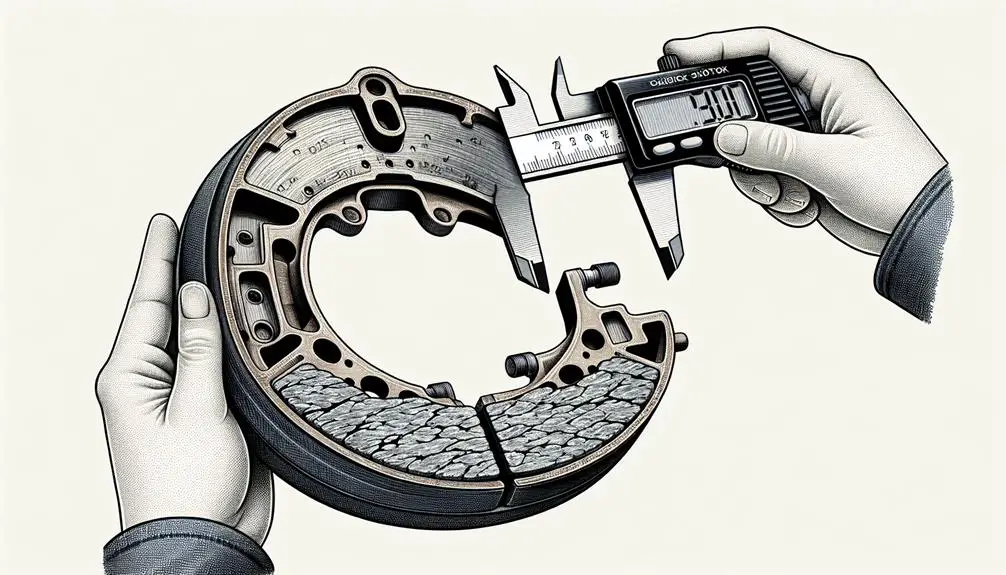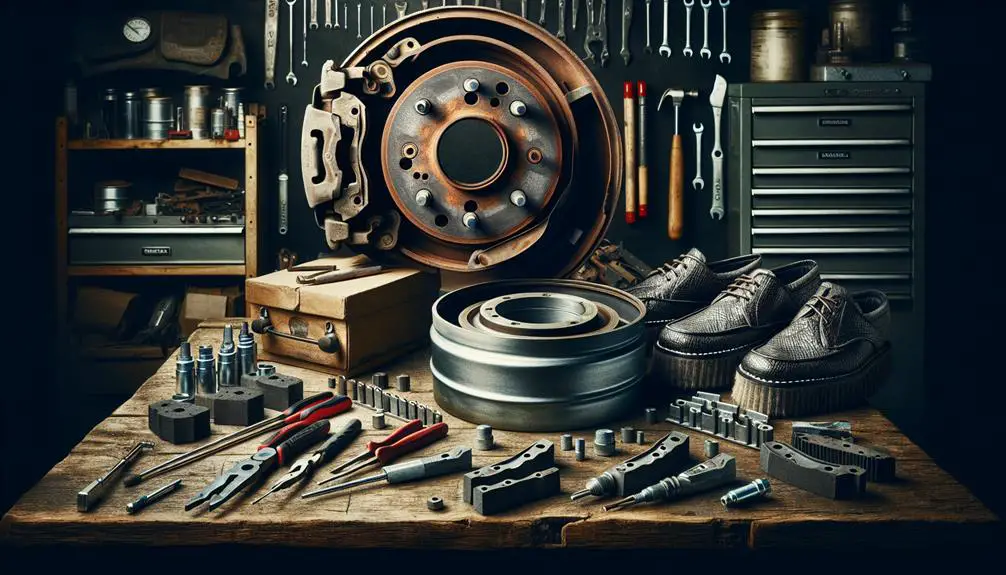Brake shoes typically last between 20,000 to 40,000 miles, but this can vary widely based on driving habits and environmental factors. These components are crucial for safe stops, yet their lifespan is influenced by several variables.
From how you drive to where you drive, the longevity of your vehicle's brake shoes can differ. Recognizing the signs of wear is essential for timely replacement to ensure your safety on the road.
Understanding Brake Shoe Lifespan

The lifespan of your brake shoes can greatly vary, depending heavily on your driving habits and the conditions you typically drive in. Generally, brake shoes are built to last anywhere from 20,000 to 40,000 miles, but don't be surprised if you find yourself needing a replacement either sooner or later than this range. It's due to the wear and tear on brake shoes not being uniform; it's a process influenced by how you interact with your vehicle every day.
Understanding this, you'll want to keep an eye on the performance of your brakes. If you start noticing a decrease in braking efficiency or if your vehicle begins to pull to one side when braking, it's likely time to check your brake shoes. These signs indicate that the material of the brake shoe has worn down significantly, affecting your vehicle's ability to brake effectively.
Factors Affecting Durability
Knowing how your driving habits and conditions impact brake shoe lifespan leads us to investigate what specifically affects their durability. While you're maneuvering through traffic or cruising on the highway, several factors come into play, directly influencing how long your brake shoes will last. It's not just about the distance you drive but additionally how you drive and what conditions your vehicle endures. Let's delve into some of these key factors:
- Driving Habits: Aggressive braking and constant stop-and-go traffic put more wear on your brake shoes compared to smooth, gradual braking. If you're heavy on the pedal, expect to replace them more frequently.
- Environment: Driving in urban areas with lots of traffic lights or in mountainous regions where braking is more frequent can reduce the lifespan of your brake shoes. Contrastingly, highway driving is generally easier on them.
- Quality of Brake Shoes: Not all brake shoes are created equal. High-quality materials tend to last longer, even under harsh conditions, while budget options might save you money upfront but wear out faster.
- Vehicle Weight and Load: Heavier vehicles or those frequently carrying heavy loads will exert more pressure on the brake shoes, causing them to wear down quicker. Remember, the more your car has to work to stop, the more strain on your brakes.
Comprehending these factors can help you make informed decisions about your driving habits and vehicle maintenance, ultimately extending the life of your brake shoes.
Recognizing Wear and Tear

To effectively maintain your vehicle's braking system, you'll need to recognize the signs of wear and tear on your brake shoes. Identifying these indicators early can save you from potential brake failure and costly repairs. Common symptoms include a decrease in braking efficiency, unusual noises when braking, and the parking brake becoming less effective. It's important to pay attention to these warning signs to guarantee your safety and the longevity of your vehicle's braking system.
| Sign | Meaning | Action Needed |
|---|---|---|
| Squealing or screeching noises | Brake shoes are wearing thin | Inspection and possibly replacement |
| Decreased braking power | Reduced friction material on shoes | Check brake shoes and replace if necessary |
| Vibration when braking | Uneven wear or damage to the shoes | Get them inspected and possibly replaced |
| Pulling to one side when braking | Uneven wear or hydraulic issues | Inspect brake system, focusing on shoes |
| Handbrake slippage | Worn out brake shoes | Replace brake shoes to restore function |
Maintenance Tips
Having understood how to recognize when your brake shoes are wearing out, it's time to focus on how you can maintain them for peak performance. Regular maintenance isn't just about extending their lifespan; it's also important for ensuring your safety on the road. Here's what you need to know:
- Regular Inspection: Make it a habit to check your brake shoes for wear and tear every few months or at every oil change. Catching signs of wear early can save you from more significant issues down the line.
- Keep Them Clean: Dirt, debris, and grime can accumulate on your brake shoes, affecting their performance. Use a brake cleaner to remove these particles and keep your brake system working efficiently.
- Monitor Brake Fluid Levels: Low brake fluid can lead to reduced braking power and increased wear on your brake shoes. Ensure your brake fluid is at the recommended level and replace it according to your vehicle manufacturer's guidelines.
- Listen to Your Car: Pay attention to any unusual sounds when braking, like squealing or grinding. These noises can indicate that your brake shoes need attention or adjustment.
Replacing Your Brake Shoes

Knowing when to replace your brake shoes is crucial for maintaining your vehicle's braking efficiency and safety on the road. You might wonder how often you need to do this. Well, it isn't a one-size-fits-all answer, as it largely depends on your driving habits and conditions. However, there are some clear signs that indicate it's time for a replacement.
First, listen for any unusual sounds when you brake. Squeaking or grinding noises are clear indicators that your brake shoes are wearing thin. Second, if you notice your car takes longer to stop than usual, this is another red flag. Lastly, you can check the thickness of the brake shoes. If they're less than 1/4 inch thick, it's time for them to go.
To help you visualize when to replace, here's a quick reference table:
| Indicator | Description | Action |
|---|---|---|
| Noise | Squeaking or grinding | Inspect & Replace |
| Performance | Longer stopping distances | Inspect & Replace |
| Physical Check | Less than 1/4 inch thickness | Replace |
Conclusion
To summarize, the lifespan of your brake shoes depends on different factors, including your driving habits and the quality of the shoes themselves. Recognizing signs of wear and following regular maintenance can greatly extend their life.
However, when it's time to replace them, don't delay. Ensuring your brake shoes are in top condition is vital for your safety on the road. Keep an eye on them, and you'll enjoy a smoother, safer drive.